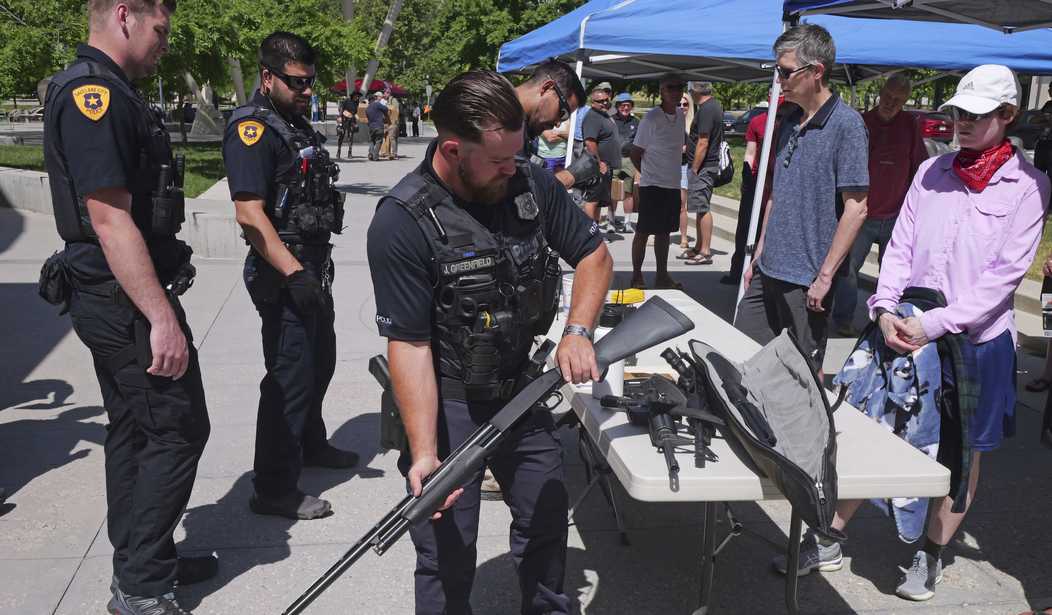President Joe Biden recently issued an executive order imposing more restrictions on gun ownership. Since he has not been able to enact his sweeping anti-gun agenda through Congress, he is taking matters into his own authoritarian hands. The order expands background checks, strengthens red flag laws, and implements other restrictions on firearms.
In response, at least two states are set to pass legislation that would effectively turn them into Second Amendment sanctuaries. Many counties and cities across the countries – especially in blue states – started enacting their own sanctuary policies over the past decade as a response to onerous gun restrictions coming from state and federal governments. However, 19 states have passed laws designed to protect gun owners.
The laws in these states vary, but what they all seem to have in common is that they prohibit local law enforcement agencies from enforcing federal gun laws that are stricter than what the state or city already has in place. It also stops local police from assisting federal agencies in the enforcement of these measures.
Over the past few years, Second Amendment sanctuaries have grown significantly. More than 1,200 jurisdictions in 37 states have adopted resolutions opposing the enforcement of state and federal laws that violate the Second Amendment. These sanctuaries can be found across the country, in states like California, Texas, Maine, Florida, Oregon, and others.
Inspired by the immigration sanctuary movement, law-abiding gun owners and their local governments have felt the need to assert their Second Amendment rights. Many believe that current laws and pending legislation, ranging from universal background checks and magazine restrictions to extreme risk (“red flag”) orders, infringe on their constitutional right to bear arms. Several states, including Alaska and Kansas, had previously passed resolutions declaring that they would not comply with any federal gun laws they deemed unconstitutional, which served as models for the Second Amendment sanctuary movement.
In fact, a judge in Oregon recently ruled that county sheriffs were not allowed to create Second Amendment sanctuaries as they violate state law.
Opponents of these sanctuaries argue that these cities and states are endangering residents by refusing to comply with federal gun control laws. They insist that these measures are effective in reducing gun violence.
But the main argument critics have put forth is the idea that it violates the Supremacy Clause of the U.S. Constitution, which stipulates that federal law overrides state and local law. Second Amendment sanctuaries view this as an effort to nullify federal gun control legislation.
However, those in favor of Second Amendment sanctuaries contend that refusing to follow federal gun control laws is justified because these restrictions are violations of the Constitution. They also point out that local governments should have the authority to establish their own gun policies instead of having distant bureaucrats impose one-size-fits-all solutions to the rest of the nation.
A federal judge earlier in March struck down a Missouri Second Amendment sanctuary law on the grounds that it violated the Supremacy Clause. “The Missouri General Assembly’s assertion that the Supremacy Clause does not extend to acts of Congress,” the judge asserted, “does not make it so.”
However, there is more to this conversation. Those opposing gun rights are missing something when they claim sanctuary laws violate the Supremacy Clause. In an earlier article I wrote about Kentucky’s sanctuary bill, I spoke with constitutional attorney Scott Cosenza, who filled in the blanks nicely.
“Upon reading the proposed legislation, there is no tension between it and the Supremacy Clause. Kentucky and other states maintain police and regulatory agencies to enforce their laws, not federal law. Therefore, it is entirely appropriate for states to decide whether or not to allow resources to be spent in cooperation with federal authorities, depending on the state’s goals,” he said.
There you have it.
The Supremacy Clause does not compel state and local authorities to enforce or assist the enforcement of federal laws. State and local governments can decide whether they wish to spend time, money, and resources to help the feds carry out their infringements on our natural rights, which is yet another reason why it is so important to focus on local politics.
However, it is important to note that these laws do not prevent federal authorities from enforcing their own laws. Federal law enforcement agencies can still work to ensure their laws are being followed and punish those who do not comply. But, without the assistance of local authorities, it will be more difficult to carry out this brand of tyranny. Still, it is encouraging to know there are folks in local and state offices who will fight to protect our rights even when the federal government is working hard to violate them.













